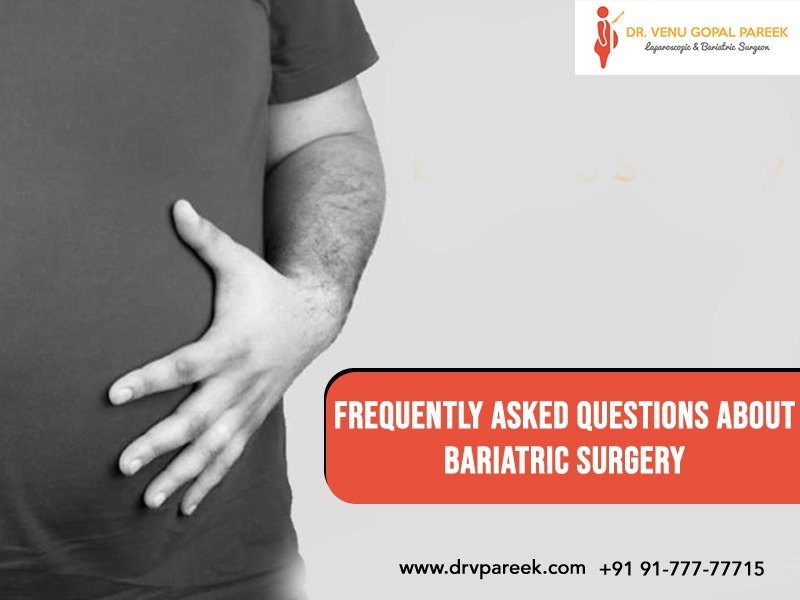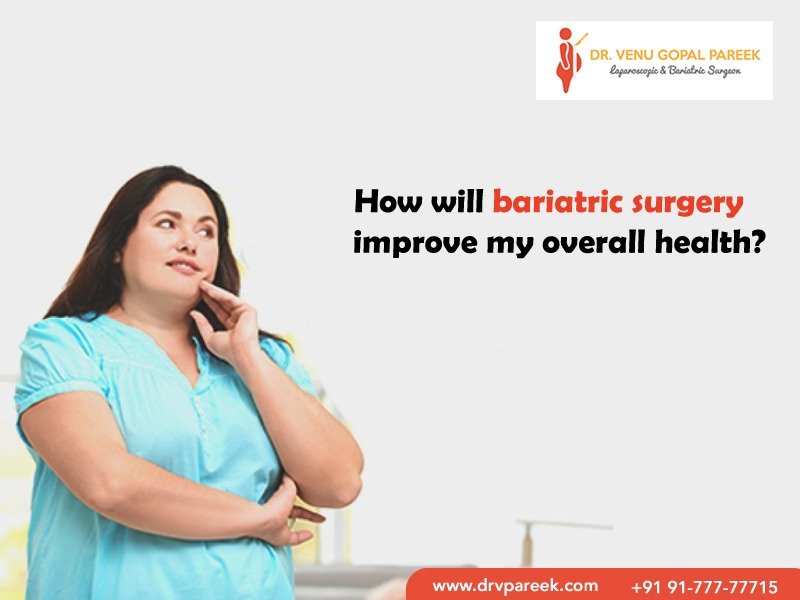
Why Do Patients Gain Weight After Bariatric Surgery?
Many people who undergo weight loss surgery are excited about the new opportunities for them after surgery. You imagine life without obesity-related diseases and ready to live your life without gaining weight.
They also worry about the possibility of gaining weight after surgery. Many patients have problems because of gaining weight after bariatric surgery. Unfortunately, some people regain weight over time after undergoing weight loss surgery. Hence, for optimal weight loss results, it is essential to follow dietary guidelines after surgery as part of your new lifestyle. Bariatric surgery has helped more than 220,000 people across India to lose weight and improve their health.
Despite all the advantages, bariatric surgery does not guarantee permanent weight loss. People who undergo specific weight loss procedures such as gastric bypass, gastric sleeve, or lap band surgery get an average of about 8 to 10 per cent of their body weight. Those undergoing weight loss procedures that limit calorie intake, such as a duodenal switch, typically maintain weight loss and experience 10 to 15 per cent more weight loss than the previously mentioned procedures.
If you’ve had bariatric surgery or are considering weight loss, it’s essential to understand that this is not a miracle cure. To maintain postoperative weight loss, you’ll need to do almost the same things everyone else is doing to maintain a healthy weight.
Dr Venu Gopal Pareek advises patients frustrated by unexpected weight gain after bariatric surgery at Sunshine hospital in Hyderabad. This article helps you to understand why patients gain weight after bariatric surgery.
Understand postoperative weight gain:
Sometimes people gain weight after having bariatric surgery because they don’t follow their doctor’s advice. Immediately after surgery, you can follow the prescribed diet and eat as healthily as possible. However, you can continue your old habits months for even years after surgery.
In other cases, eating habits do not lead to weight gain. With some procedures, the stomach can enlarge after surgery. For example, after gastric bypass surgery, we tighten the stomach to make a small pouch that only contains one ounce of food at a time. However, the pockets of the stomach can stretch beyond this limit, resulting in more calories being absorbed than necessary. Sometimes a corrective procedure can solve this problem. But even in this case, it is essential to follow the plan prescribed by the doctor after the operation.
Why do patients gain weight again?

Bariatric surgery is known to produce dramatic weight loss: patients often report a loss of up to 60 to 75 per cent of their original body weight. Despite these impressive statistics, many patients watch their weight or even start increasing months or years after the procedure again.
Common cause:
Several reasons can trigger weight gain. Sometimes the cause is as simple as how patients dive into their diet or exercise. In other cases, this can indicate surgical complications. But weight gain is often only due to normal physiology. The human body is designed in such a way as to store energy reserves in times of starvation. Once your body adjusts to its new digestive system, it begins to maximize energy absorption. As a result, sufferers often gain weight.
Top Reasons To Gain Weight After Weight Loss Surgery:

- Skipping Meals: If you skip meals, you lose the calories and nutrients your body needs at that time. You will not be able to eat more physically at your next meal than before the surgery. If you eat fewer and fewer calories, you can’t lose weight anymore. You will stop losing weight and lower your metabolism. Lower metabolism at a certain point in time equals weight gain. The longer you eat without feeling hungry, the more you will hunger. Starvation causes overeating and poor food choices.
- Not sticking to a balanced and healthy diet: Developing healthy habits and losing weight before surgery can make the transition more comfortable after surgery. If you eat a lot of breakfast or enjoy certain foods, it is very important to limit this tendency or find healthy substitutes before surgery. Eating a healthy diet full of whole grains, fruits, vegetables, and lots of lean protein can help you maintain your weight after surgery.
First of all, most people should be on a complete liquid diet for a few weeks after surgery. However, after this time, you can start a long-term diet. People who have had sleeve gastrectomy and the gastric bypass will need 60-80 grams of protein per day after surgery. For patients with duodenal switches, they need 80-100 grams per day. This is because protein keeps you full and is essential in helping your body repair, replace and fight infection. Lack of protein can lead to hair loss, fatigue, and muscle loss. Hence, it is an essential part of the postoperative diet.
You also need to watch your blood sugar closely. Reduce or avoid simple carbohydrates such as white bread and white rice, as well as pastries such as candy, doughnuts, and ice cream. Instead, focus on complex carbohydrates and high-fibre foods such as fruits, vegetables and whole grains.
- Drink calories: Fluids don’t fill you up the way food does. Drinks are added calories and can easily lead to excess, leading to weight gain.
- No exercise: Weight loss should be about 80% of the diet and 20% of physical activity. Despite the low number, exercise is important for losing weight and maintaining weight. In my experience, movement is more important in the maintenance phase than in the loss phase. Exercise builds metabolically active muscle. This means that the more muscle you have, the more calories you will burn at rest. In general, your metabolism becomes more efficient.
- Unbalanced diet: Eating too many carbohydrates and too little protein. The optimal foods for satiety are protein, carbohydrates and healthy fats. This combination increases satiety and keeps you full longer.
- Too much alcohol and caffeine: Alcohol and caffeine are high in sugar and empty calories. You should drink this drink in moderation or not at all if it triggers you.
After surgery, drink plenty of water, eat soup, and drink mostly clear, sugar-free liquids such as decaffeinated tea, G2 Gatorade, Vitamin Water Zero, and Crystal Light. Dehydration is a problem after surgery, and drinking enough fluids can cause persistent vomiting, which can lead to vitamin deficiencies. Focus on 64 ounces of clear liquids to stay hydrated each day.

- Lack of support: We all need support at some point in our lives. Joining a support group for weight loss surgery can help. Talking to people who have also had weight loss surgery can make you feel less lonely on the way. Studies show that people who actively participate in this group have a body mass index of about 10 per cent lower than those who don’t.
- Nutritional advice: This is also very important. Most hospitals offer this service through comprehensive programs aimed at long-term weight loss. This is an excellent resource for many bariatric patients to work with a nutritionist to monitor their diet and health after surgery. The key is to be actively involved in the process and to receive advice from professionals who are there to help you.

To prevent weight recovery after weight loss surgery, patients should follow a healthy eating plan with an emphasis on whole foods and continue to follow nutrition guidelines after surgery. Suggestions to keep travelling are:
- Eat lean protein, whole grains, low-fat dairy products, fruits, and vegetables.
- Avoid foods with more than 15 grams of sugar per serving.
- Choose low-fat foods.
- Monitor your protein intake and consume at least 60 to 80 grams/day. Foods that contain protein will help you stay full and full.
- Take time to eat at least three times a day. Eating slowly (20 to 30 minutes/meal) is also very important.
- Make sure your fluid needs are met with 48 to 64 ounces of low or low-calorie drinks.
- Separate food and drinks for 30 minutes, this is a necessary nutritional principle that must be continued.
- Continue to take a daily multivitamin and mineral supplement.
- Exercise 250 to 300 minutes a week. This level of activity plays a vital role in maintaining weight loss.
Conclusion:
Once you lose weight after surgery, your journey will not end. You still have to be careful and pay attention to what you eat, how much you weigh, and how you exercise. Weight loss surgery is just a tool. The operation will only help you so far. It’s up to you to use this tool wisely.
If you feel like you’ve fallen into old eating habits, don’t be afraid to seek help. By building a strong support system, improving your relationship with food, and creating new healthy habits, bariatric surgery can be a valuable tool in promoting long-term success in weight loss.
Maintaining a healthy weight over the long term is difficult for everyone. Still, it can become especially tricky after bariatric surgery when you need to change your approach to food completely. No one wants to feel like you’re on a diet all the time, but you should treat these diet changes as part of a new, long-term, healthy lifestyle. If you are worried about gaining weight before and after the surgery, meet Dr Venu Gopal Pareek for best treatment options. Bring healthy snacks to avoid cravings for unhealthy foods and consult a nutritionist, or personal trainer if necessary. It’s hard to hold on to a weight for the rest of your life, but with the right support, you can do it. To meet Dr Venu Gopal Pareek by booking your appointment at 091777 77715.







